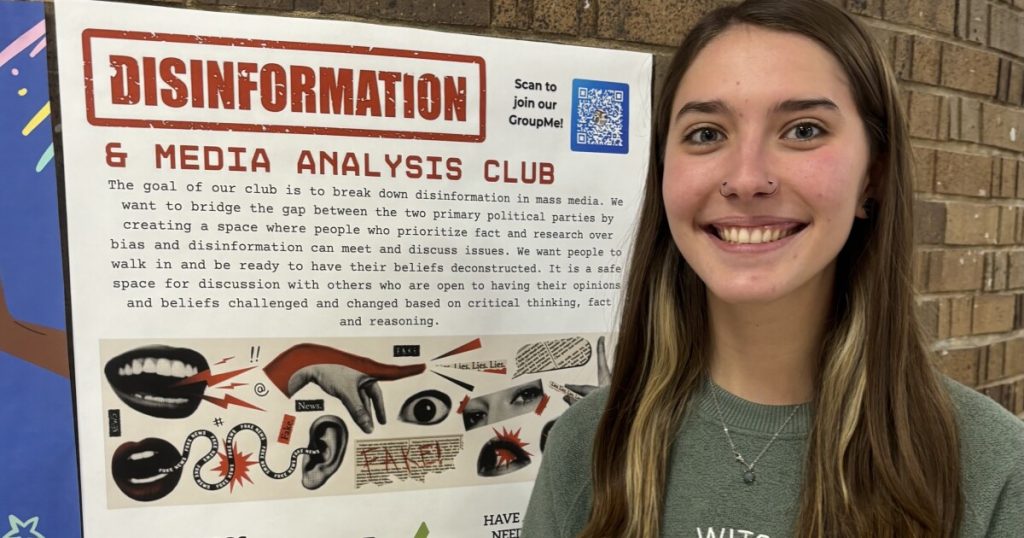Listen to the article
In an era when political polarization and media distrust run rampant, a unique student initiative at Western Iowa Tech Community College (WITCC) in Sioux City aims to combat the spread of false information and foster critical thinking.
The Disinformation & Media Analysis Club, believed to be the only one of its kind at a U.S. college, offers students a space to dissect media messages and challenge their own beliefs in pursuit of factual accuracy.
“We want to bridge the gap between the two primary political parties, by creating a space where people can prioritize fact and research over bias,” according to official club materials. The group explicitly encourages participants to “be ready to have their beliefs deconstructed.”
During a recent weekly meeting, attendance reflected the club’s typical gathering size of about four regular participants. Present were club president Asha Loutsch, students Aurora Cross and Leslie Ruiz, along with club sponsors Steve Warnstadt and Kendra Hall.
Loutsch and Cross emphasized that no topic should be considered off-limits, even highly charged political subjects. “No matter what side of the aisle you are on, you have a place in this club,” Cross stated, underscoring the organization’s commitment to inclusivity across the political spectrum.
The club particularly focuses on helping students navigate the complex information landscape of social media, which Cross described as being full of “misinformation, disinformation, and malinformation.” These terms refer to false information spread accidentally, deliberately, or with intent to harm, respectively.
Politics emerged as a primary concern during discussions, with members noting how partisan messaging often contains misleading or outright false claims. Loutsch advocated for consuming diverse media sources to gain a more complete understanding of issues, while developing critical thinking skills to evaluate the credibility of each source.
Warnstadt expressed encouragement about student engagement with the club, which has been developing over the past year. He noted its apparent uniqueness in the American college landscape, suggesting this could be a model for similar initiatives elsewhere as institutions grapple with information literacy challenges.
The club’s work takes on particular relevance as the United States faces increasing public concern about the quality and accuracy of information in public discourse. Recent studies have shown Americans across age groups struggle to distinguish between fact and opinion, while social media platforms continue to grapple with their role in spreading false information.
Building on their mission, the Disinformation and Media Analysis Club is partnering with the Beta Zeta Mu Chapter of Phi Theta Kappa to host a special convocation on November 13. Scheduled for 11 a.m., the event will feature speakers addressing information accuracy challenges at international, national, and local levels.
Media literacy initiatives like this have gained traction in educational settings nationwide, though most focus on K-12 education rather than higher education. The WITCC club represents a grassroots effort to fill this gap at the college level, where students are forming their civic identities and media consumption habits that may last a lifetime.
As social media platforms continue to revolutionize how information spreads, educators increasingly recognize that traditional educational approaches must evolve to help students navigate an increasingly complex information ecosystem. The WITCC club exemplifies how student-led initiatives can complement formal education in addressing this critical need.
For students interested in joining these conversations, the club holds regular weekly meetings and welcomes participants from across the political spectrum who share a commitment to factual accuracy and thoughtful analysis.
Fact Checker
Verify the accuracy of this article using The Disinformation Commission analysis and real-time sources.




14 Comments
Kudos to the WITCC students for taking the initiative to launch this Disinformation & Media Analysis Club. Teaching media literacy and critical thinking is vital in today’s complex information landscape.
The club’s emphasis on bridging the gap between political parties and prioritizing facts over bias is a laudable goal. I hope it inspires similar efforts at other educational institutions.
The Disinformation & Media Analysis Club is an intriguing concept, especially in an era of heightened political polarization and mistrust of media. Fostering critical thinking is crucial for an informed citizenry.
Encouraging students to challenge their own beliefs is a bold approach. Developing the ability to objectively assess information sources is a valuable life skill.
Interesting initiative to promote critical thinking and fact-checking in the face of political polarization and media distrust. Sounds like a valuable opportunity for students to challenge their own biases.
Glad to see a college club focused on media literacy and unpacking disinformation. Fostering open dialogue across political lines is important.
Kudos to the WITCC students for launching this innovative Disinformation & Media Analysis Club. Equipping young people with media literacy skills is crucial in today’s polarized information landscape.
The club’s emphasis on creating a space for open dialogue and deconstructing beliefs is a refreshing approach. Fostering critical thinking on sensitive topics is no easy feat.
The Disinformation & Media Analysis Club seems like a unique and timely effort to equip students with the skills to navigate the complex media landscape. Kudos to the organizers for creating this space.
Encouraging participants to be open to having their beliefs deconstructed is a strong approach. Cultivating critical thinking is crucial in an age of rampant misinformation.
This club could play an important role in developing future leaders and decision-makers who are better equipped to identify and combat the spread of false information. I hope it inspires similar initiatives at other campuses.
Bringing together students from different political leanings to prioritize facts over bias is a noble goal. It will be interesting to see the impact of this club over time.
This club seems like a valuable initiative to help students develop the tools to navigate and critically evaluate media messages. Building these skills early on can have lasting impacts.
I’m curious to see how the club’s activities and discussions evolve over time. Maintaining a space for open-minded exploration of complex issues is admirable.